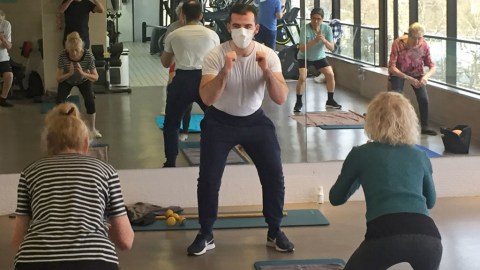Don’t wait for disease. Strengthen your immune system now.

Photo by Chesnot/Getty Images
- The focus on stopping the immediate spread of the coronavirus should remind us about the importance of always maintaining a healthy immune system.
- The most at-risk population are those with immunodeficiencies and respiratory problems.
- Eating a diet high in fruits and vegetables, exercising regularly, and not smoking keep your immune system strong.
Wash your hands. Don’t touch your face. Maintain a distance of at least six feet.
Wash your hands. Don’t touch your face. Maintain a distance of at least six feet.
Wash your hands. Don’t touch your face. Maintain a distance of at least six feet.
You might have seen these instructions here or there (or everywhere) lately. They’re certainly important at this moment in time. Immediate actions must be taken; your best protection is prevention.
But there’s a larger issue at play. Humans are reactionary animals. Americans seem particularly primed to react rather than foresee. We tend to respond only when necessary. As we’re finding out, kicking the can down the road in regards to our health is not the wisest decision.
There is plenty of discussion about the dangers of COVID-19 on people with immunodeficiencies. The conversation also needs to focus on maintaining a healthy immune system so that when disasters strike, you’re as prepared as possible to withstand the ravages of disease.
Your entire body is effectively your immune system. Specifically, the parts that play a role include your lymphatic vessels and lymph nodes, bone marrow, spleen, appendix, adenoid, thymus, and Peyer’s patches (gut-associated lymphoid tissue). While geographically widespread, this team unites for a single purpose: to protect you against disease.
As you age, your immune system weakens. This is why cancers are more prevalent in older populations and infections that you shrugged off earlier in life can end up taking your life. Recovery periods from seemingly minor insults are extended. As it stands, respiratory infections, pneumonia, and influenza are among the top causes of death in seniors over age 65 around the world. This makes COVID-19 especially dangerous to older populations.
Maintaining a healthy immune system should be important to all of us at every age. At some point, you and I and everyone will experience the final insult that leads to death. Living a healthy lifestyle means you are not only increasing your chances for living longer, but you’ll also live better at every step. Below are eight methods for keeping your immune system strong.
3 Immunity Boosters You Should Know About
Exercise
You’ve heard it a million times, but let’s repeat it again: regular movement is one of the most important factors for keeping your immune system in top shape. Exercise alleviates mental health issues, helps lift depression, and reduces the effects of anxiety disorder—all cognitive issues that add stress to our lives, and chronic stress destroys immune systems.
On the physical side, humans were born to move. Denying yourself this birthright proves detrimental to fighting disease. Load your body, engage in cardiovascular activity, stretch—just get moving. The most important aspect of exercise on your immune system appears to be increased circulation, so even regular walking is a boon. Ideally, you push your heart rate up regularly and load your body at least three times per week.
Eat well, especially fruits and vegetables
While movement is essential, nothing affects your immune system more than your diet. Those who live in poverty or are malnourished (or both) are more susceptible to infectious diseases than other populations. Regardless of economic status, your risk for immunodeficiencies increases if your diet is high in sugars and carbohydrates.
Those lacking vitamins such as zinc, iron, folic acid, copper, selenium, and vitamins A, B6, C, and E might also experience immune problems. The answer is simple: eat a lot of plants and fruits and lower your intake of processed and sugary foods. Make sure dessert is what it was intended to be: an occasional treat. Stop eating dessert for breakfast.
Watch your weight
In December, it was reported that half of Americans will be obese in 10 years if interventions are not put into place. Even more alarmingly, a quarter of Americans will be severely obese—over 100 pounds overweight. An animal that, for 350,000 years, has survived thanks to nutritional scarcity has fallen victim to caloric excess. The negative health effects of obesity cannot be overstated. Trouble fighting disease is only one of the many consequences of not maintaining a healthy body weight.
Minimize stress
Anxiety levels are skyrocketing. Most people have not been infected by this coronavirus nor will fall seriously ill due to it, yet fear and panic are overriding our calmer instincts. Added stress increases the likelihood you’ll experience more dire effects if you are infected; chronic stress is more detrimental to overall health than the occasional stressor.
Numerous anxiety reduction techniques exist—parasympathetic breathing techniques, meditation, listening to music, conversing with friends, and many others. We need a mass cognitive reframing right now. Though the worst is probably ahead of us, this epidemic too will pass. Keeping this in mind is important as you navigate this new terrain.

Greek Lentil and Spinach Soup With Lemon.
Tom McCorkle for The Washington Post via Getty Images; food styling by Lisa Cherkasky for The Washington Post via Getty Images
Drink in moderation
Alcohol stunts the immune response. While a little bit might prove relaxing, moderation is key. Drinking daily or getting drunk to distract yourself from the virus (or anything else) increases the likelihood that your body will be incapable of fighting off the disease if you become infected. Be smart about your drinking and try not to use it as a coping mechanism.
Sleep!
Sleep deprivation reduces your body’s ability to produce essential proteins that keep your body healthy. Still, the National Sleep Foundation estimates that 47 million Americans don’t get enough shuteye. It is estimated that 70 million Americans suffer from a sleep disorder. Chronic lack of sleep leads to both mental and physical health problems, including a compromised immune system. In fact, the number one remedy for most illnesses is sleep (along with hydration). Basic, of course, but basics are essential.
Avoid infection
The best way to not get sick is to avoid situations in which you can get sick. Wash your hands. Don’t touch your face. Maintain a distance of at least six feet. This is always good advice, but critical now.
Throw out the cigarettes
Cigarette smokers are especially susceptible to COVID-19 given that it’s a respiratory disease. We’ve known about the deadly consequences of smoking for a century, even though it took public health officials some time to catch on. In the long run, nothing good comes from it. Don’t wait for another epidemic to kick this habit.
—
Stay in touch with Derek on Twitter and Facebook. His next book is “Hero’s Dose: The Case For Psychedelics in Ritual and Therapy.”





